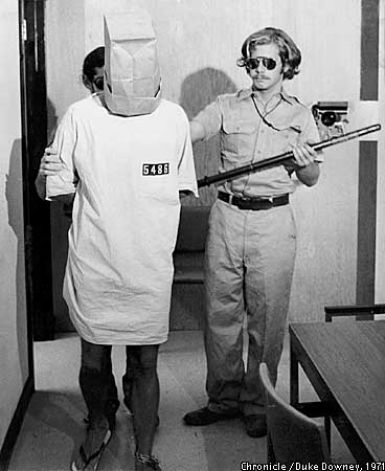This week, I’d like to speak
about what makes a person evil. This is going to be based on a Ted Talk that I
recently watched, given by Professor Zimbardo and relating to the crimes
against humanity committed by American soldiers in Abu Ghraib. Zimbardo is a
psychologist who conducted the Stanford Prison Experiment, in which he used university
aged males to simulate a prison environment, giving one group the title of ‘prison
wardens’ and hence the other group became the ‘prisoners’. Zimbardo observed
that it didn't take long for the prison wardens, who were given power, to
blindly follow orders from the experimenters and hence display acts of cruelty
and injustice towards the helpless prisoners, who in turn displayed signs of
mental breakdown within a short number of days. Overlooking the obvious and
blinding ethical problems with this study, Zimbardo managed to show a different
side to evil than what is generally given in movies, books and other media
sources.
Many stories centre on a clear
distinction between good and evil; take Harry Potter, where the distinction is
made clear by which house one is sorted into, or the Lord of the Rings (yes I’m
aware I’ve mentioned LotR in more than one post now), where, for the most part,
being good or evil merely depends on what race you are. This overly simplistic view
of two dichotomies causes problems when we translate these beliefs to our own
reality. The prison wardens and prisoners in the Stanford Prison Experiment
weren’t different in any way at the beginning of the experiment, however by the
end, one group were committing sadistic acts on the other. So yes, it can be
seen that good and evil seem to fall into group patterns. However, Zimbardo
argues that the order should be reversed; one is not put into a group because
one is evil, rather a group can become evil if the situation leads them to it. This
hypothesis is validated in the event of the Abu Graib prison tortures, where
previously upstanding American soldiers were told by authorities to obtain information
from the prisoners as soon as possible. Blind obedience of these orders,
stemming from values that are generally accepted and celebrated in our society
such as respect for authority and ability to follow instruction, and a group
mentality perpetuated by a misguided value of ‘doing the right thing’ and ‘serving
one’s country’ resulted in horrific acts of physical and sexual violence and
humiliation.
For me, this understanding of
evil is terrifying. It is basically stating that, if given certain orders in
certain situations, any human can commit evil acts. And from my understanding,
following orders is something that is, if not innately human, definitely taught
to us by school, family values and society as a whole. If this is the case,
then anyone is capable of evil – and I think everyone has a few dark thoughts
occasionally that can testify to the postulation that there is a bit of evil
inside everyone. An interesting means of proof for this, I think, comes from
the popularity of ‘shock jocks’ in the media – take Kyle Sandilands, for
example, who is known for some very rude and derogatory comments and is
generally publicly chastised for these comments, but whose listeners all
followed him when his radio show moved stations. I think that the reason Sandilands
is popular is because he merely voices all the negative thoughts that we
sometimes have, and it’s comforting to know that someone else is also thinking
them, but that someone is worse than you because he’s actually gone ahead and
voiced these thoughts. So from ZImbardo’s theory, anyone can be evil if they’re
in the right situation – which just means that those who haven’t committed any
acts of evil have just been lucky enough to avoid such trying environments.
However, as Zimbardo points out
(and I fervently cling to this inkling of hope for humanity), there are people
who stand up and act as the ‘hero’, who are not slaves to blind obedience. And
the only way that we can do that is if we’re aware of what is happening around
us, and, more importantly, aware of what’s going on inside our own heads. If we
KNOW that we’re in a situation that could possibly cause us to act cruelly
towards others, then at least we may question our subsequent decisions. It is
important that, while we may enjoy epic tales of battles between good and evil,
we keep in mind that one person is not born ‘good’ or ‘evil’. As Sirius Black wisely points out:


No comments:
Post a Comment